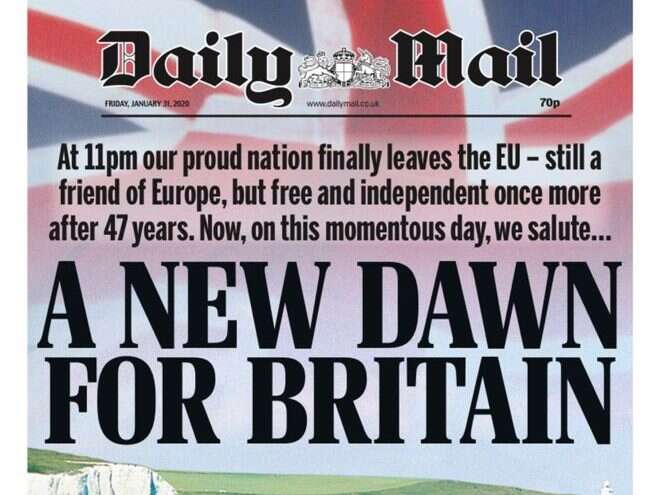
It’s almost five years since the UK voted to leave the EU in June 2016. Since then, hundreds of thousands of articles have been devoted to the UK’s withdrawal in British media outlets.
Press attention to Brexit has waxed and waned – peaking at certain key moments, research by Press Gazette has found.
Analysis of articles in 12 UK national news outlets and their Sunday editions (The Sun, the Daily Mail, the Telegraph, the Times, the Financial Times, the Independent, the Guardian / Observer, the Mirror, the Star, the Express, the Evening Standard and Metro) shows that coverage for example was notably high in the months immediately leading up to the 2016 national vote. Attention also rose again in March 2017 when Article 50, which began the UK’s withdrawal, was invoked. Similarly, the number of Brexit-related headlines rose again at the end of 2020 – the end of the transition period.
Using Media Cloud, an open source content analysis tool, we first searched for articles containing at least one key term such as “Brexit”, “EU Referendum” or “Brussels”. We then refined the list of headlines returned by Media Cloud to some 102,000 headlines that mentioned these key terms to ensure that the articles retrieved were focused on Brexit as far as possible.
A further sentiment analysis of headlines in the same outlets found that whether in pro-Brexit or anti-Brexit titles, the tone of the debate has been negative throughout with little change in the overall tone over time. The analysis did not however, reveal if the negativity in coverage is directed towards Brexit or the European Union – only that the overall sentiment is not positive.
Excluding stop words and words that routinely appear in Brexit-related headlines such as “UK”, “Brexit”, and “government” that do not convey an opinion, analysis of the remaining words suggest that some 60% to 85% of the language used in Brexit headlines is negative.
Looking at headlines in several individual titles, we found that the Express leads for headlines with a negative sentiment, in contrast to the Financial Times where the sentiment was more positive.
Previous research such as studies by the Reuters Institute for the Study of Journalism in 2016 and 2019 have found that coverage of Brexit has been highly polarised. A 2016 analysis by Press Gazette similarly revealed that press reports on Brexit have been highly biased with three quarters of front page stories about Europe on UK national press front pages in the run up to the referendum on leaving the EU favouring Leave.
A further look at the usage of the most popular negative terms such as ‘chaos’, ‘disaster’, ‘betrayal’, ‘crisis’ and ‘threat’ shows that although overall sentiment has remained negative since 2016, frequency of usage of these terms fluctuated, rising in the months immediately after the UK’s exit in January 2020.
Our analysis also suggests there are big differences when it comes to favoured words by title. The Daily Express, which holds one of the strongest pro-leave positions in the UK media, favoured emotive words with a strong negative sentiment with ‘warning’, ‘shock’, ‘plot’ and ‘crisis’ among the leading words used in its headlines once stop words and common neutral terms were excluded. The Guardian, which has been pro-remain, while also turning to a lot of negative words, also commonly used words with a positive sentiment such as ‘free’ and ‘support’ in its Brexit-related headlines.
Email pged@pressgazette.co.uk to point out mistakes, provide story tips or send in a letter for publication on our "Letters Page" blog
